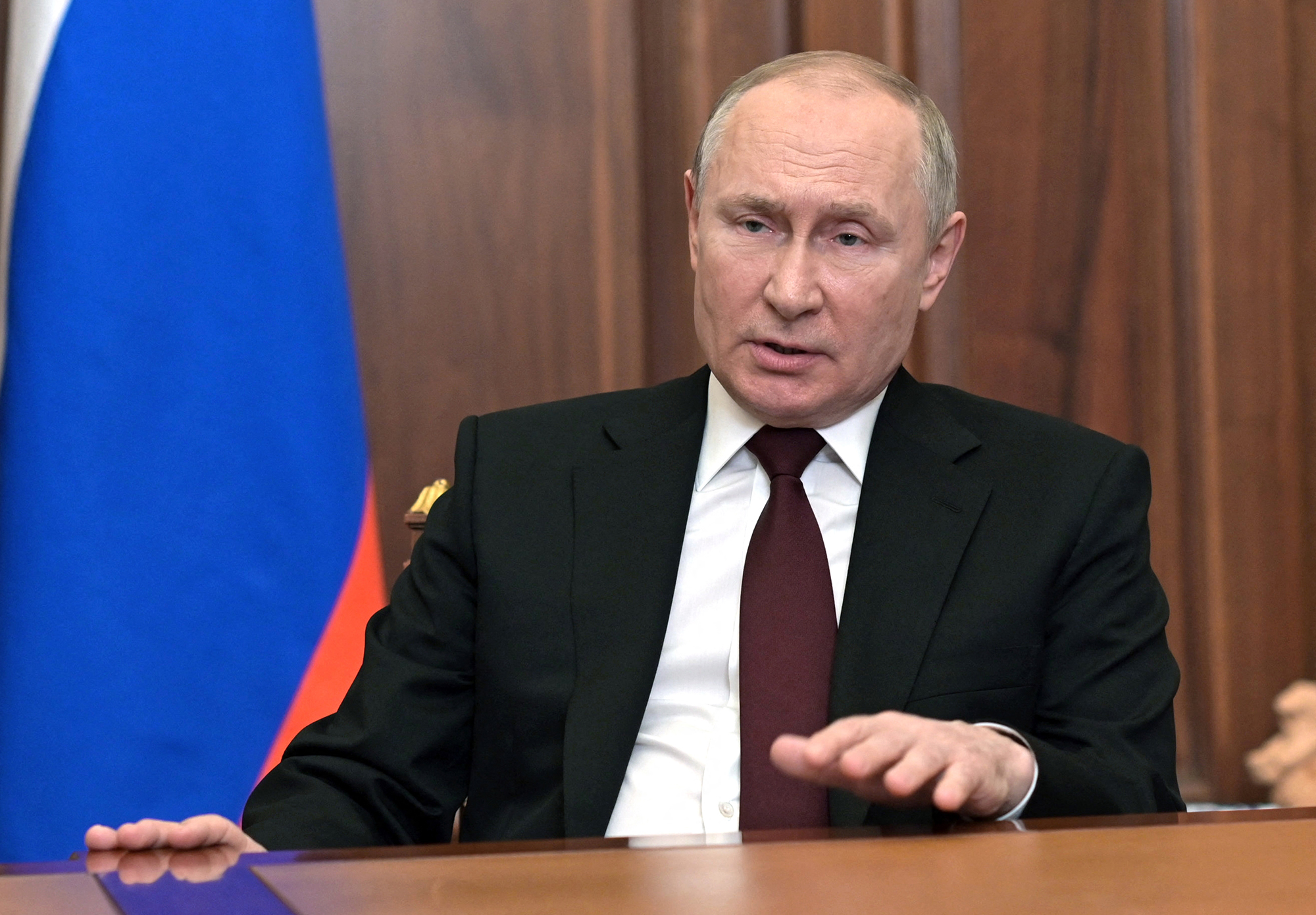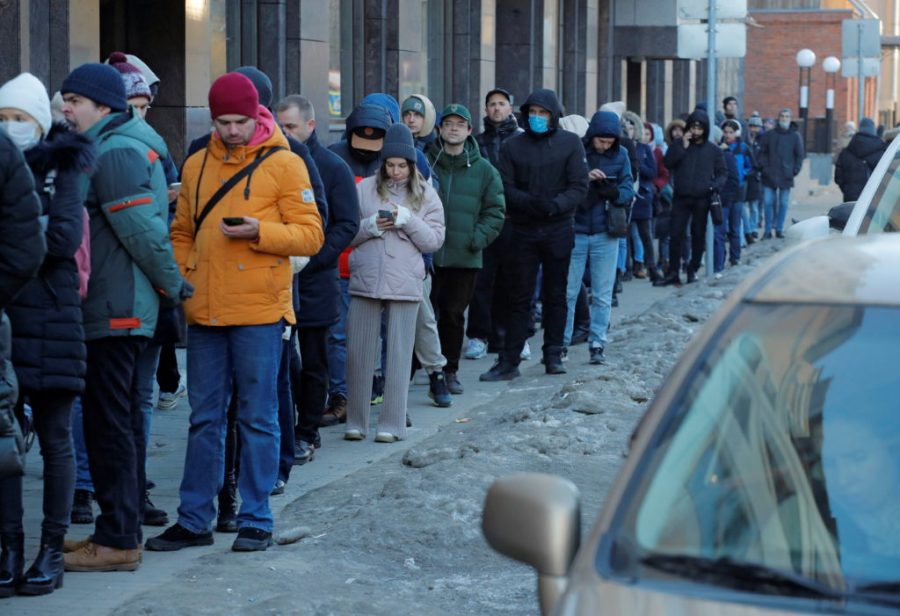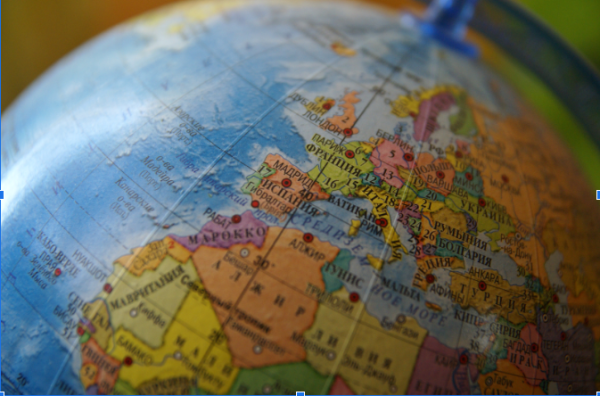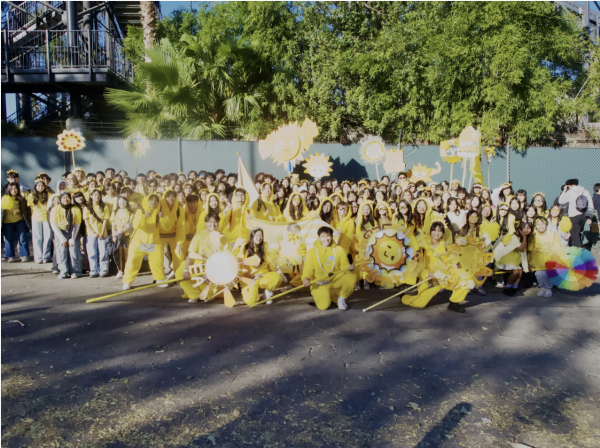Russian Economic Sanctions
People stand in line to use an ATM money machine in Saint Petersburg, Russia February 27, 2022. REUTERS/Anton Vaganov
As the invasion of Ukraine continues, Western countries have decided to wage a different kind of battle against the Russian Kremlin. In the days following the announcement of the Ukrainian invasion by President Putin, the US, UK, and other European countries have placed severe economic sanctions on Russian banks, oligarchs, and businesses.
The economic sanctions began with the US and UK freezing Russian assets of the most influential Russian economic institutions. These include the Sberbank, VTB Bank, and Sovcombank, the three largest institutions within Russia, compiling a net worth of 1.53 trillion dollars, constituting about half of the Russian economy. The sanctions have led to a decline of the value of the Russian Ruble by almost 50% compared to the American dollar. As of now, the West has no plans to end sanctions anytime soon as long as the invasion of Ukraine continues.
However, Russia has been fighting back against global sanctions through various means. Over the last decade, Russia has stockpiled billions in gold reserves to exchange into the ruble currency, attempting to keep it afloat. Russia has also made alliances with global-market powerhouses like China. It has prompted many Americans to wonder whether the sanctions will create significant problems in Russia. Brandi Hoxworth, a senior at Anaheim High, believes, “ I don’t think the sanctions will amount to much. Russia is also fighting back like how they legalized privacy to combat the loss of name brands leaving their country.” She recalls how several brands like Mcdonald’s, Starbucks, and Apple, to name a few, have pulled all their products and stores from Russia following the invasion.

How do the sanctions impact the Russian Public?
Although the sanctions have had a limited impact on the billionaire Russian oligarchs and the Kremlin, the Russian public is reeling from its effects. Shortly after the fall of the ruble exchange, Russians rushed to ATMs and banks to withdraw euros in rubles before its value dropped further. According to NPR and the Moscow Times, the effects were so severe that Moscow banks refused to withdraw any more euros or dollars to Russian citizens. Erica Barrios, a senior at Anaheim High, tells us, “ I think we won’t see the results of the sanctions for many years. I think the sanctions work to cripple Russia in the future rather than impacting them right now.” She references how the decrease of the ruble will continue long past the invasion, creating more significant problems for Russia compared to what they are experiencing at the moment.
Despite the harsh consequences of the Ukrainian invasion, many Russians have yet to express sentiments against the war. It’s primarily due to the efforts of the Russian government cracking down on opposition to the war. Russian protests are being met with force by the Russian state police, arresting over 7000 people. According to NPR, any mention of opposition to the war in Ukraine is met with fines or threats by the Russian government. However, dozens of protests have sprung up around Russia as the war in Ukraine intensifies.

On Tuesday, March 8th, President Biden took the anticipated step of banning Russian energy imports. Although Russian gas only makes up about 8% of the USA’s supply, the effects were immediate with the rise of gasoline prices across the country. According to AP News, “Energy analysts warn that prices could go as high as 160$ or 200$ a barrel if buyers continue shunning Russian crude”. The shunning of Russian oil by the US has started a trend within the rest of the developed world. As more countries follow the US in embargoes, the price of Russian oil will go down; consequently, the price for the rest of the world will continue to rise as demand for oil from other countries continues.
Sources:
https://nymag.com/intelligencer/2022/03/the-wests-sanctions-on-russia-are-working-too-well.html
https://www.bbc.com/news/world-europe-60125659
https://home.treasury.gov/news/press-releases/jy0608
https://www.npr.org/2022/03/02/1083694848/sanctions-russia-ukraine-economy-war
https://apnews.com/article/us-russian-oil-ban-what-does-it-mean-731f748450c38fc34353d96aea6897fe
Your donation will support the student journalists of Anaheim High School. Your contribution will allow us to purchase equipment and cover our annual website hosting costs.

Joseph Garcia is a senior at Anaheim High School. Some of his hobbies include playing videos games, reading, and playing chess. It is his second year in...









